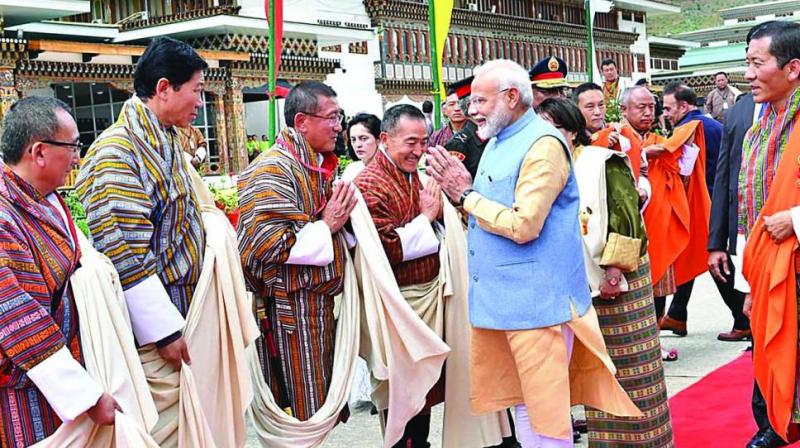Wary China watches India-Bhutan bonhomie

Prime Minister Narendra Modi’s recent two-day visit to Bhutan has relevance in the context of neighbourhood security. In the aftermath of China’s exertions in the UN Security Council on Pakistan’s behalf following the recent changes effected by India in Jammu and Kashmir, Beijing too is likely to read a message in Mr Modi’s trip. Bhutan has borders with both India and China.
The difference is that with China, Bhutan has a disputed 500-kilometre boundary. In India, on the other hand, the relationship has not just been tranquil but also one of great mutual cooperation for the past 50 years. India has been Bhutan’s biggest trading partner, investor, infrastructure builder and export recipient.
With China, Bhutan is yet to enter into a diplomatic relationship although official interactions have increased of late in light of Beijing making an extra effort to woo Thimphu, just as it has India’s other SAARC (South Asian Association for Regional Cooperation) neighbours. The Doklam crisis of 2017 increased the complexity in Thimphu-Beijing ties and New Delhi-Beijing ties, besides raising a degree of worry in India-Bhutan relations. Bhutan would hardly want to be in a position of being forced into a position of choice.
The PM’s visit evidently helps assuage these concerns, should Bhutan still harbour them. Continuing India’s traditional policy, Mr Modi had chosen Thimphu as the first capital to visit on becoming PM in 2014 and in his second term has again gone to Bhutan very early.
Mr Modi had given the call “B4B” — Bharat for Bhutan, Bhutan for Bharat. There seems to have has been some action on this front during the PM’s recent visit with the arc of cooperation expanding to digital payments through the medium of RuPay and also space research.
A deeper level of interaction which favourably touches the common people in Bhutan is needed now, especially since our northern neighbour is no longer an absolute monarchy but has turned a constitutional monarchy in which political parties compete for power. In such a situation many kinds of voices will surely be heard. The King, who was closely aligned to India, has chosen to withdraw from dictating policy.
For all these reasons Beijing is likely to have been following Mr Modi's Bhutan visit closely. The Indian leader's trip to Thimphu was preceded earlier in the week by the visit to Bhutan of US deputy secretary of state John Sullivan. From Thimphu Mr Sullivan flew to New Delhi and had a friendly meeting with external affairs minister S. Jaishankar. The message the senior US official gave in Bhutan was that through his country’s friendship with Thimphu, America looked to expand the “rule-based” order in the Asia-Pacific.
The import of this is likely to concern China which, being a communist state, is not deemed a rule-based order. In New Delhi, Mr Jaishankar shared the US message in a tweet, which is suggestive of India's endorsement of the US stance in Bhutan.

